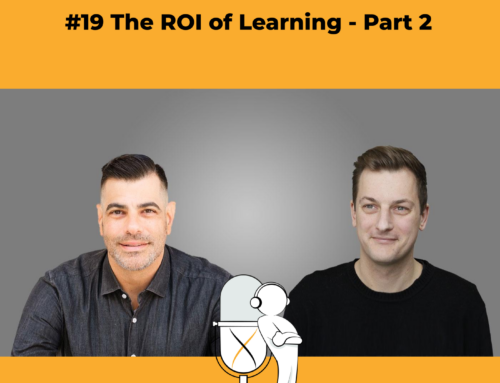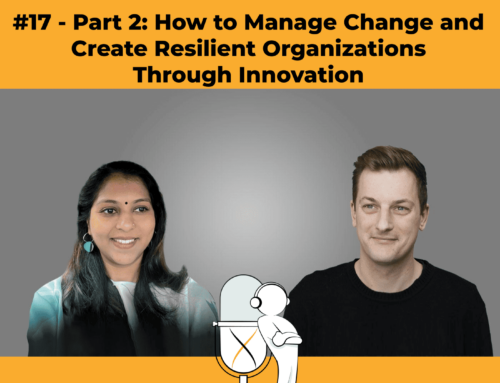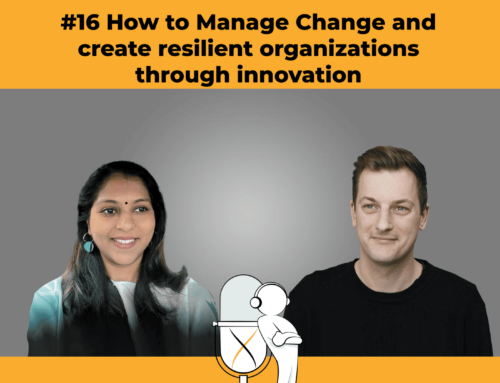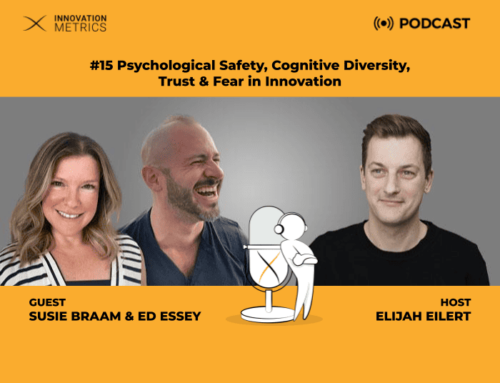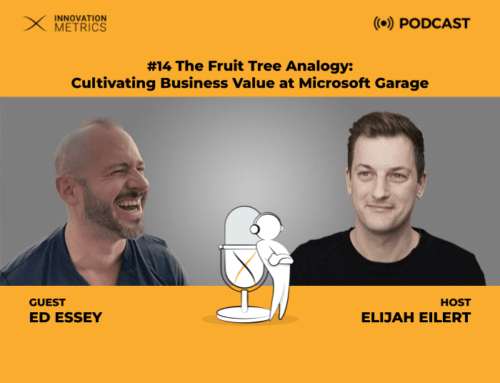Episode 18 – Part 1: The ROI of Learning
About the Episode
Elijah Eilert is talking to Peter LePiane about innovation within large organizations. Part one of the podcast, explores the core principles of innovation, the challenges associated with measuring its impact, and the formidable obstacles faced in corporate landscapes.
Starting with the question of “What is Innovation?” Peter offers his perspective, emphasizing the fusion of novelty and impact in the concept of innovation. According to him, innovation involves the introduction of genuinely new ideas or solutions to the world, with a keen focus on how these innovations are received within the market. The episode underscores that innovation is not limited to grandiose endeavors like space exploration; it can manifest subtly yet profoundly in various aspects of a business. Transitioning to the topic of “Measuring Innovation,” the podcast shines a spotlight on this often-overlooked aspect that is crucial for evaluating the effectiveness of innovation efforts. Finally, the conversation confronts the significant hurdles that hinder innovation within large organizations. From challenges rooted in organizational design and financial models to the complexities of incentive structures and cultural mindsets, the barriers that can impede progress are dissected. The episode aims to provide practical insights into overcoming these challenges and fostering a culture that actively promotes and sustains innovation.
Topics and Insights
[02:28] What is Innovation?
Peter’s perspective on innovation combines novelty and impact. For him, innovation is about introducing something new and meaningful to the world, with a focus on both the idea itself and its reception in the market.
- Innovation is a complex concept, often meaning different things to different people.
- Key element: Newness – something genuinely new or groundbreaking.
- Example: Even improving efficiency in a manufacturing plant could be considered innovative if it introduces a new approach.
- Not necessarily about launching rockets or exploring Mars, but introducing something novel to a market.
- Novelty is essential, but it’s not enough on its own.
- The Importance of Impact
- Innovation must have a tangible impact or value.
- People must care about it for it to truly matter.
- Requires a practical business model or a container to bring it to market effectively.
- The market should demand it, making it an essential ingredient of innovation.
- The “Tree Falling in the Forest” Analogy
- Innovation that goes unnoticed or unappreciated might not truly qualify as innovation.
- It’s like the philosophical question of whether a tree falling in the forest makes a sound if nobody hears it.
[08:28] How Should Innovation be Measured?
- Interrogating the Notion of Measuremen
- The podcast delves into the intriguing question of how to quantify innovation effectively.
- The focus is on whether measurement means seeking signs of success and discerning the impact of innovation.
- Benchmarking Against Initial Expectations
- The discussion emphasizes that assessing innovation often involves gauging whether it lived up to the expectations initially set for it.
- Innovation frequently demands substantial investments in terms of time, resources, and capital.
- These expectations can be both internal, rooted in what the innovator believes the market will desire, and external, influenced by competitors or industry norms.
- Significance of Understanding Expectations
- The viewpoint put forth suggests that grasping the initial expectations is pivotal when measuring innovation.
- These expectations serve as a reference point against which the actual performance of the innovation can be evaluated.
- Measuring innovation should primarily concentrate on its alignment with these initial anticipations.
[30:59] What are the biggest blockers to innovation in large organizations?
- Organizational Design: A Key Challenge
- Exploration of how the design of large organizations can pose significant obstacles to innovation.
- Mention of financial models in sectors like banking and insurance that often require substantial upfront investments in unproven ideas.
- Emphasis on the necessity of adapting organizational design, including funding models, to foster innovation.
- Incentive Structures and the Experimenter’s Mindset
- Introduction of incentive structures as a pivotal component of organizational design influencing innovation.
- Explanation of the “experimenter’s mindset” as a cultural facet linked to organizational design.
- Highlighting the significance of distinguishing between facts and assumptions in decision-making.
- Measuring Innovation Progress
- Discussion on metrics and tools for tracking innovation progress within large organizations.
- Emphasis on establishing learning metrics to gauge the effectiveness of innovation efforts.
- Mention of real-world examples where learning metrics have proven invaluable.
- Overcoming Resistance to Change
- Insights into strategies for overcoming resistance to change when reshaping organizational design.
- Discussion on the role of leadership in driving these changes successfully.
- Fostering an Innovation-Friendly Culture
- Exploring the role of culture in supporting innovation within large organizations.
- Strategies for cultivating a culture that embraces experimentation and learning.
About the Guests
Meet Peter LePiane, the accomplished management consultant with a track record of helping organizations transform how they validate and launch products and services. With a background in start-ups, incubators, venture capital, and professional coaching, Peter has spent the last two and a half decades refining his consulting toolbox serving a diverse range of clients from midsize companies to large, multinational corporations in industries including financial services, insurance, retail, telecommunications, consumer packaged goods, and fragrance manufacturing. Do you need to create the next big breakthrough but don’t know how to discover what your customer wants with certainty? Feel like you need to redesign how your organization thinks and operates but you don’t know where to start? Do you know that culture follows structure but don’t know what part of the structure to change first? Peter is the innovation change maker who can empower you to break through the status quo.
Peter’s professional coaching background differentiates and allows him to be the brave champion required in the face of drastic organizational mindshifts. It equips Peter to help both leaders and teams of innovation change shape their habits towards:
- Generating and investing in ideas that align to the organization’s Innovation Thesis
- Recognizing and challenging assumptions
- Outcome-based and disciplined experimentation
- Designing from a customer and human-centred perspective
- Acknowledging learning as the most valuable corporate currency
- Trading the dream of future assumed success for the reality of current customer feedback
Peter’s most prominent innovation transformation accomplishments include:
- Co-created an internal innovation services organization within Canada’s most valuable and respected telecommunications company with annual revenues of $17B.
- Ingraining assumption-challenging, experimentation, and customer-centric habits into a highly regulated, multinational organization’s culture.
- Transforming two of Canada’s big five banks to a culture of innovation and agility.
- Creating leading-edge Lean Innovation and Agile training content delivered across Canada and at Queen’s University School of Business.
- Transitioning one of Canada’s largest TSX listed insurers and wealth managers with over $36B in assets under administration to agility.
Resources from Peter
Articles
- The Worst Case of Best/Worst Case Decision Making
- Innovation Accounting is dead. Long live Innovation Accounting!
- Stop guessing how risky your Riskiest Assumptions are
- Why you suck at estimating and what to do about it
- How to measure the impact of individual investments
Financial Modelling Startup



